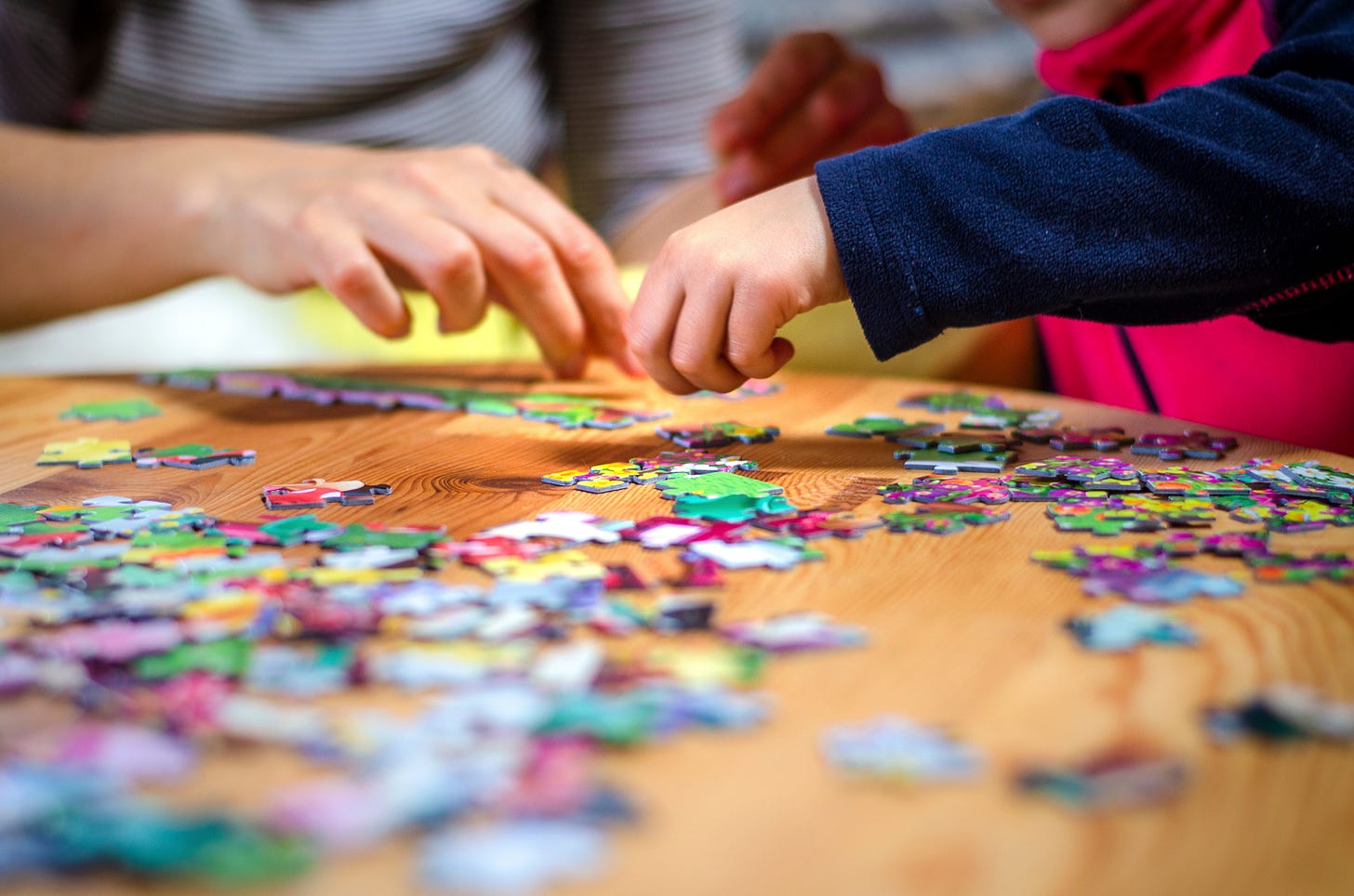Pardon the interruption in our normal programming. I’ve been good about publishing once a week, and I’ve made it several months without missing a Wednesday. I was really looking forward to concluding my series on The Hidden Curriculum of Success.
But it’s been a hell of a week.
The time that I would normally reserve for writing was instead spent shopping, planning, and packing…to help my son move away to college. He’s our last child to leave, so the house is especially quiet now. My wife and I haven’t ever been without at least one child in the house (her having had a daughter from a previous marriage), and our very identities have been wrapped up in being parents—cooking, washing, organizing, planning, playing, teaching.
If you’ve been paying attention to The Revisionist at all, you know that I believe in the power of writing to create understanding, so of course my reaction to all of this upheaval was to write.
So I sat down to write my son a letter. The first part was reflective and personal, and I won’t bother sharing it here. The second part was more practical. Being a dad (and an educator), I wanted to leave him with a handful of reminders—a mixture of the things that worried parents tell their grown children when they leave their care (eat real meals; drink plenty of water; text your mom) and the wisdom I’ve acquired as someone who has worked in higher ed for over twenty years. I called it “Bits o’ Wisdom: College Edition,” because I’m funny like that.
As I wrote, those reminders started to shift. What had been intended as practical advice revealed itself as something else: a set of habits, almost rituals, for living well. College is one of those rare thresholds in life, when you step from one world into another with almost no warning. You leave behind the patterns that have held you for eighteen years and suddenly have to decide, often unconsciously, what kind of person you are going to be. The choices feel small (whether to show up to class, whether to ask for help, whether to stay in touch), but over time they accumulate into habits, and those habits become character. They can bend you toward or away from resilience, curiosity, and care.
I wrote the letter for my son, but as I reread it I realized it wasn’t just for him. It was for me at nineteen, stumbling into adulthood. It was for the students I’ve taught, who often needed permission to do what seems obvious: rest, reach out, take a risk. And it was for anyone standing at a threshold, whether or not that threshold looks like a dorm room.
This essay gathers those “bits o’ wisdom” into something more than a list of reminders. Each seems simple on the surface, but together they form a pattern, a way of moving through life transitions with attention, humility, and courage. My hope is that in sharing them, I can extend the letter I wrote to my son into a meditation on what really matters—not just in college but in the lifelong work of becoming.
Go to Class & Say Yes
When I was in college, I skipped a lot of classes. Not all of them—just enough to convince myself I was clever for getting away with it. I told myself I could learn the material on my own, that I didn’t need to sit through another hour of lectures. More often than not, I was probably sleeping in, reading non-required books, or killing time in some forgettable way.
Now, after years on the other side of the classroom, I see the absurdity of that logic. Showing up is, by far, the easiest part of learning. You don’t need to be brilliant or inspired or even particularly awake—you just need to be in the room. It’s astonishing how much of life is like that: the opportunities that arise simply because you were present when something happened. A conversation that leads to a friendship. A question that opens a new line of thought. A stray comment that lingers for years. None of these moments can be scheduled. They only happen if you’re there.
That’s the first piece of wisdom I offered my son: go to class. Not because attendance earns you points or keeps you out of trouble, but because the habit of showing up compounds. It’s a form of discipline, yes, but more than that, it’s a posture of attention. Being there—even when it’s inconvenient, even when you don’t feel like it—is how transformation sneaks in through the side door.
As a coach, it’s a concept I try to teach my athletes as well—the difference between motivation and discipline. If you need to be “motivated” to do what needs to be done, you’ll never succeed. Discipline is the ability to do what needs to be done, even when (and especially when) you don’t feel like it.
The second piece goes hand in hand with the first: say yes. College is full of invitations, some trivial, some life-changing, and you can’t always tell which is which in the moment. Say yes to the awkward conversation with the person down the hall. Say yes to the club meeting that sounds a little strange. Say yes to the chance to study abroad, even if it scrambles your carefully laid plans. Not every yes will pan out. Some will lead to dead ends or embarrassing stories. But that’s beside the point: the habit of openness matters more than the outcome of any single decision.
And when discipline and openness meet, good things happen. Going to class is about showing up; saying yes is about being open once you’re there. Both are easy to dismiss, because neither feels dramatic or heroic. But they are the small hinges on which the door of growth swings. Looking back, I regret the opportunities I said no to out of laziness or fear. The failures I can live with. It’s the missed chances—the absences—that linger.
When I think about what I most want my son (or any student) to know, it’s this: growth doesn’t announce itself. It doesn’t arrive with trumpets or formal invitations. It shows up disguised as Tuesday morning class, or an acquaintance who knocks on your door, or an opportunity that interrupts your schedule. Most of us are too distracted or too cautious to notice. But if you can practice the simple habits of showing up and saying yes, you give yourself a chance to be changed in ways you couldn’t have planned.
Of course, showing up isn’t just about classrooms—it’s also about showing up for yourself.
Take Care of Yourself & Ask for Help
One of the hardest lessons of college (and adulthood) is realizing just how fragile you are. Not fragile in the sense of weak or incapable, but fragile in the sense that your body and mind keep score. You can’t cheat them for long.
As a professor, I’ve seen what happens when students treat themselves as machines. They skip meals, pull all-nighters, mainline energy drinks or turn to “study drugs” to keep themselves alert. For a while, it works—or at least, it looks like it does. But sooner or later, the cracks show: one missed deadline turns into a cascade of missed deadlines, a sudden collapse into illness, a fog of anxiety that won’t lift. The irony is that the students most determined to “succeed” are often the ones who drive themselves straight into burnout.
When I began my PhD, I was thirty years old. We had just bought our first house, my son had just been born, and we had a daughter entering middle school. And I was working full-time. In case you don’t know, there is a lot of reading in a doctoral program (especially in English), more than anyone can possibly manage. At first, I tried pulling all-nighters—staying up to the wee hours long after everyone else had gone to bed, fueling myself with black coffee and sheer hatred of failure.
But eventually, I could feel my mind and body falling apart. So I flipped it. I started going to bed early and getting up an hour or two before everyone else. I did my reading and writing in the quiet of the morning, when my mind was rested and receptive. What I discovered was that I was doing more (and better) work in that two hours than I had in an entire night of cramming. I’ve stayed that way since.
That’s why I told my son: take care of yourself. Eat food that nourishes you. Sleep more than you think you need. Walk outside. Save time for exercise. Call someone you love. These aren’t luxuries, and they’re not distractions from “the real work,” they are the conditions that make the real work possible.
But there’s another piece, one that feels even harder to practice: ask for help.
Independence is the great myth of college. We send eighteen-year-olds away from home and tell them they’re “on their own” now, as if strength means never needing anyone again. But real strength—lasting strength—is interdependent. Nobody makes it through life without support, and nobody succeeds entirely on their own. The students who thrive are rarely the ones who never stumble; they’re the ones who stumble and then reach out.
Asking for help feels risky to high-achieving students because it feels like exposing weakness. But in truth, it’s an act of humility and wisdom. To say “I can’t do this alone” is not to admit failure—it’s to recognize reality. And paradoxically, it’s how resilience is built: not by pretending to be invincible, but by learning how to recover.
The deeper danger of never asking for help is that you start to believe you’re supposed to go it alone. And once that lie takes root, it grows into isolation, shame, and sometimes despair. I’ve seen too many students pay that price, and I have suffered through it myself. What I want my son to know—and what I wish I’d known sooner—is that seeking help isn’t a last resort. It’s a practice of care, for yourself and for those who love you enough to walk alongside you.
Take care of yourself. Ask for help. The two belong together. Self-care without interdependence can turn into self-absorption; interdependence without care collapses under its own weight. But when they work together, they create something stronger: a sustainable way of living that recognizes both your limits and your worth.
And often, what you need most help with is discerning where your attention belongs.
Notice What You Notice & Find Your People
My son has always been the kind of person who notices things. When he was little, he would stop on walks to touch the leaves of interesting plants, smell every candle in the store, and point out birds I hadn’t seen. He still does this—pausing in the middle of a crowded room because something small caught his attention. (Most importantly, he always notices when somebody needs help…)
College is full of noise: schedules, assignments, part-time work, social obligations, the constant hum of other people’s expectations. It’s easy to move through it all on autopilot, doing what everyone else is doing, never pausing to ask: What is it that draws me? What is it I can’t help but notice?
“Notice what you notice” was the first piece of advice given to me when I began my doctoral program. Thirteen of us sat in a room, anxiously waiting for everyone else to realize that we weren’t really that smart, didn’t know what we were doing, and didn’t really belong. I remember watching the other students glancing nervously over their shoulders, sizing each other up.
After the usual orientation lectures and motivational speeches, they opened it up for Q&A, and the youngest-looking one in the room, a brilliant scholar of early American literature, raised her hand and asked: “How will we even know what to pick for our dissertation? There’s just so much.”
The director of graduate studies, a wildly popular professor who resembled Edna Mode from The Incredibles, smiled wanly and said, “Notice what you notice.”
The things you notice, whatever tugs at your attention even when you’re not trying, often reveal what matters most to you. Maybe it’s a subject that sparks your curiosity. Maybe it’s an injustice that bothers you more than it seems to bother others. Maybe it’s the way you feel energized after helping someone, or calm after a long run, or alive in a rehearsal room. These little clues are worth paying attention to. They’re compass points that help you navigate when you’re not sure where to go next.
But noticing is only half of it. The other half is finding your people.
College is where most of us first discover that who we surround ourselves with matters as much as what we study. Friendships are not just diversions; they are formative. The people you spend late nights with, the ones who know when you’re spiraling and pull you back—these people will shape the person you become.
In classrooms, I’ve seen students learn as much from one another as from any text or lecture. Education is not just a transaction of information; it’s a process of becoming in community. We find ourselves mirrored in our friends, stretched by their differences, steadied by their presence. To find your people is not to collect a crowd, but to discover a circle where you can be both challenged and at ease.
Notice what you notice. Find your people. These two pieces belong together because they form a loop: attention reveals your affinities, and the right community helps you trust and deepen them. Curiosity without belonging can lead to isolation; belonging without curiosity can collapse into conformity. But together, they guide you toward a life that feels both authentic and connected.
If I could go back and tell my younger self anything, it might be this: don’t ignore the small things that stir your attention, and don’t try to figure them out alone. Pay attention. And then look around for the people who are paying attention to the same things. That’s where the real education happens.
And of course, when you stretch toward new attention and new people, you will fail sometimes.
Learn from Failure & Stay in Touch
My son has always been a perfectionist. At daycare, during free play, his favorite activity was jigsaw puzzles. We’d walk in the door, the teacher would call his name, and he’d glance up at us—and then turn back to his puzzle. He couldn’t leave for the day without finishing it and putting it neatly back on the shelf.
He likes to get things right, and when he doesn’t, it gnaws at him. I recognize the trait (it’s one of mine, too), and I know how heavy it can be to carry into a world of trial and error.
The truth is, you will fail. Everyone does. You’ll bomb an exam you thought you had mastered. You’ll say something hurtful that you later regret. You’ll disappoint someone you love. It is not a matter of if, but when.
I shared with my son the axiom attributed to Nelson Mandela: I never lose. I either win or learn. That is the heart of resilience. Failure is not evidence that you don’t belong; it’s the starting point for growth. Every setback is an iteration. You take what didn’t work, you adjust, and you try again. What matters isn’t the fall itself, but what you make of it.
But failure is hard to metabolize alone. If you’re a perfectionist, mistakes can form a mental feedback loop, and left alone with your thoughts, failure can curdle into shame. That’s why the second piece of wisdom is just as important: stay in touch. Call home. Text a friend. Let the people who know and love you be your ballast. When the ground shifts under you—as it inevitably will—you need roots that reach deeper than your current circumstances.
Staying in touch isn’t just sentimentality—it’s survival. Study after study confirms what most of us know in our bones: we are sustained by connection. Relationships don’t eliminate struggle, but they make it bearable. And more than that, they remind us who we are when we start to forget.
Failure and connection belong together. To fail without connection is to be crushed. To be connected without ever failing is to live an unremarkable life. But when you allow yourself to stumble, and you let others see you stumble, you discover something stronger than perfection: you discover resilience, and the grace of being carried by others when you can’t carry yourself.
If there’s one thing I most want my son to remember, it’s that perfection is not the point. Staying in touch—with your people, with yourself, with the deeper current of meaning that runs beneath all of this—is what matters.
Success by yourself is meaningless.
Resilience is what endures, and resilience is always rooted in relationships.
Closing
It’s only been a few days, but things seem to be going well. He’s exercising, going out with friends, and putting himself out there in ways that surprise both of us.
But I’m not naive, and I don’t pretend that my “bits o’ wisdom” will spare my son from mistakes. He will miss classes. He will say no when he should have said yes. He will push himself too far, try to carry too much alone, fail in ways that sting, and go too long without calling home. That’s inevitable. But maybe, when he does, he will remember that these practices are still waiting for him. He can return, and he can begin again (the theme of The Revisionist, if you’ve been a careful reader).
The same is true for all of us. Whether or not we are eighteen and moving into a dorm, we are always standing at some threshold—starting something new, leaving something behind, figuring out how to live in the midst of change. And in those moments, what matters most are not grand achievements or perfect plans, but the small, steady habits that bend us toward becoming.
So this letter to my son becomes, in the end, a letter to myself, and maybe to you, too: take these reminders with you. They are not just for college. They are for life.









Even though I’m on the other side of this now, so much of the letter resonated with me as I transition into the next phase of life. Thank you, as always, for your wisdom Dr. Mox :)
I am an aunt. I felt as emotional as their parents during college drop-off. Thank you for this. It’s so helpful. I will save and refer back to it often.